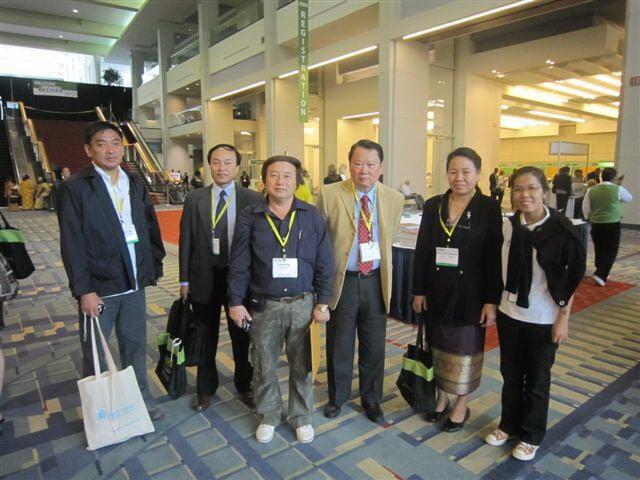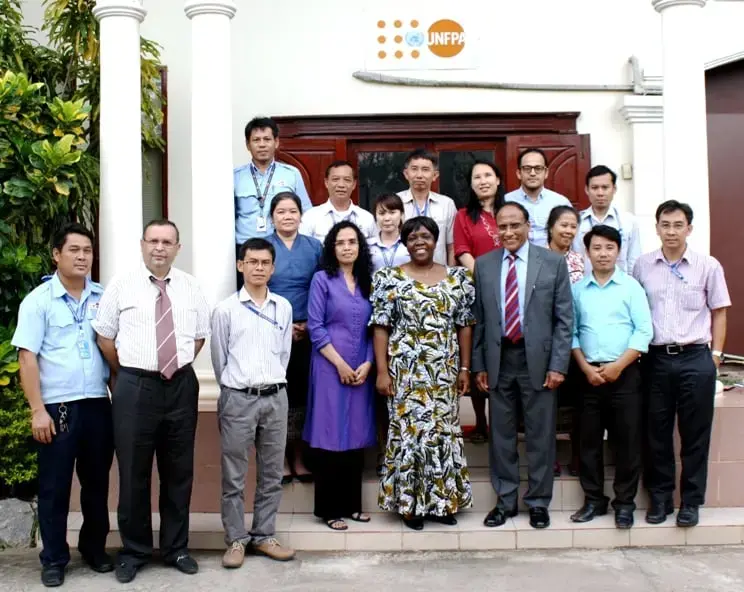Vientiane (Lao PDR): The Lao delegation led by Dr. Ponmek Dalaloy, Minister of Health, has just returned to Vientiane having attended the global Women Deliver Conference, held in Washington DC from 7 to 9 June. The Conference, opened by the UN Secretary General, Ban Ki-moon brought together over 3,000 policymakers, advocates, business leaders and public figures from 143 countries around the world. to generate political commitment and financial investment in women and young girls for fulfilling Millennium Development Goal (MDG) #5 - to reduce maternal mortality and achieve universal access to reproductive health, and to contribute to MDG #4 Reducing under-five deaths, especially newborn deaths, MDG #6 control of HIV AIDs for which more action is needed to reduce sexually transmitted infections and MDG # 3 promote gender equality and empower women. At the conclusion of the Conference, the Ministers Forum issued a call for increased investments in maternal health and health of young girls. Dr. Ponmek Dalaloy also attended the presentation of new ways of estimating Maternal Mortality and celebration of 50 years since the discovery of the Oral Contraceptive Pill, which has done a great deal to increasing women and couple control over their own fertility and is one of the three pillars to reducing Maternal Mortality.
Invigorated by his attendance at this global event, Dr Ponmek Dalaloy, is convinced that despite the many challenges that face Lao PDR, it can be possible to reach the MDGs, even MDG #5, for which some experts have places Lao PDR on the list of countries least likely to reach the MDG target. "We must inform everyone that we can do. What I have seen from attending this conference is that we know how, we have all the ingredients needed to succeed, including the political will, we just have to renew our efforts" said Dr Dalaloy.
In Lao PDR, everyday at least two women die because of problems related to pregnancy and childbirth. For every woman who dies, there are about 30 who survive but suffer from lifelong disabilities or ill-health because of some complications on pregnancy and childbirth. Even though the country has made substantial progress in the past 20 years to improve maternal health and the Maternal Mortality Ratio is estimated to be down from 650 (1995) to 405 (2005) per 100.000 live births, although new estimates are suggestive this could be lower, but we have to wait for the official UN estimates later this year, the figure in Lao is much higher than neighbouring countries with similar GDP. To further reduce the number of women who die giving birth, more work needs to be done. All pregnancies should be wanted, young girls must be given education, information and support to delay onset of pregnancies until at least their late teens, all pregnancy women should receive at least four antenatal check up starting as soon as the women thinks she is pregnant, and all births must be attended by a professional skilled health worker, ideally in a facility where referral to hospital can be made easier if any problems arise in the woman or newborn and men must play their part in ensuring the safety and health of women in pregnancy and childbirth and after birth.
"We must renew our efforts and get the message out, that everyone has a responsibility to fight these tragic silent deaths. No women should die at time which is meant for celebration, birth should be a time of joy not sadness" said Dr Dalaloy. Saving the mother is the same as saving the future life of the newborn, ensuring the continuity of families and communities and safe guarding the health and wellbeing of the nation. If all women had access to family planning, skilled attendance at birth and emergency obstetric and newborn care, the vast majority of maternal and newborn deaths could be prevented." said Mieko Yabuta, Representative of UNFPA, the United Nations Population Fund who accompanied the Lao delegation along with Dr Yuango Liu from World Health Organization and Mrs Della Sherratt also from UNFPA. "When women and newborn survive, families, communities and nations thrive"
The national delegation to the conference included Dr. Boungfeng Phoummalasith, Deputy Director of Cabinet, MoH; Ms. Douangsamone Dalavong, Deputy Director of Cabinet of Lao Women Union; Dr. Kenkham Fasauen, Chief of Hygiene and Disease Prevention Division in Xiengkhouang Province; Dr. Alongkone Phengsavanh, Vice Dean of Postgraduate Training and Research, MoH; Dr. Phouvong Bounhome from Mahidol University.
During the Conference, the Minister met with UNFPA Executive Director, Dr. Thoraya Obaid, who congratulated Lao PDR on its many achievements in the area of reproductive health, many of which were led by the Minister of Health Dr Dalaloy.
Immediately prior to the Conference UNFPA, in collaboration with key partners, co-hosted the Symposium on Strengthening Midwifery Services with the aim to build the consensus required to make a fundamental push for investments in strengthened midwifery services, including education, regulation and association, as a way to reach MDGs 4, 5 and 6. Mrs Sherratt gave a presentation at the symposium on the global situation of midwifery, including the investments being made in Lao PDR. Lao PDR will see its first graduates exiting from the new Community Midwifery Programme at the end of the year, in accordance with its' National Skilled Birth Attendance Plan 2009-2012 launched in Dec 2009. 160 Community Midwives will be produced annually, but more than 2000 are needed, consequently the Ministry of Health is looking at ways of increasing the production of midwives, especially female midwives, but without a loss in quality.
Contact information:
Diego De La Rosa, tel: (+856 21) 315547, mobile: (+856) 020 7791053, drosa@unfpa.org.




